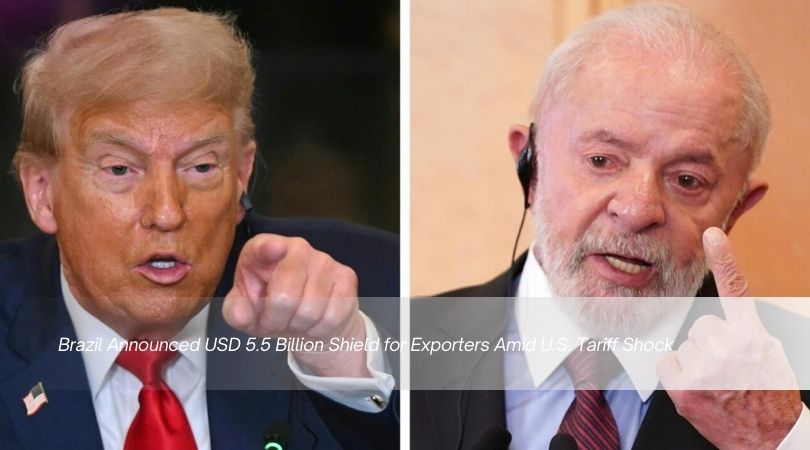Brazil is stepping swiftly into action to support its exporters after the United States suddenly raised import tariffs on Brazilian goods from 10 % to 50 %. On August 12, 2025, President of Brazil announced a substantial relief package about U.S. 5.55 billion in credit support to help companies adjust to the severe shock. This plan, to be officially unveiled in Brasília the following day, also incorporates measures like targeted government purchases to offer additional assistance.
Behind this move lies the state development bank BNDES and its rarely used Export Guarantee Fund, valued at around 9.2 USD Billion. Sources indicate the government is looking to reallocate roughly USD 5.5. Billion from this fund to finance advantageous credit lines for affected exporters loans that come with low-interest rates and repayment grace periods, contingent on firms maintaining current employment levels.
The aggressive U.S. tariff hike hit hard, though Brazil managed to secure exemptions for key products, including orange juice and aircraft, shielding a slice of its export sectors. Steering away from retaliation, the government prioritized relief over retaliation. Initial considerations for reciprocal tariffs or punitive moves have been put on the back burner while Brazil focuses on internal economic resilience and supporting its industries.
This diplomatic stance extends to international discussions: a scheduled virtual meeting between Brazil’s Finance Minister Fernando Haddad and U.S. Treasury Secretary Scott Bessent was abruptly canceled, frustrating Brasília’s hopes for negotiations. In response, Brazil plans to accelerate efforts to tap other markets especially in Southeast Asia and to pursue a Mercosur EU trade agreement to diversify its export dependencies.
President Lula has firmly rejected any direct talks with President Trump, citing a lack of mutual respect and the risk of humiliation. He emphasized diplomacy through multilateral channels and strengthening ties with BRICS partners as more constructive paths forward, including potentially filing a collective complaint at the WTO.
One of the striking outcomes of this escalating trade dispute is Brazil’s economic resilience. Despite mounting tensions, the Brazilian real has appreciated by 13 % against the dollar in 2025, and the benchmark Ibovespa stock index has gained about 11%. This performance is attributed in part to the relatively closed nature of Brazil’s economy only about 12% of its exports go to the U.S. and the exemptions covering nearly half of its U.S.-bound exports.
Looking back, Brazil was proactive in preparing relief ahead of the tariff implementation. Initial planning included public credit lines and export financing support, avoiding tax exemptions and steering clear of retaliatory measures that could harm domestic consumers. Industry-specific help such as tailored credit lines for major exporters like Embraer was also on the table.
By taking this step, the government also intended to send a message to international investors and trade partners that Brazil values stability and predictability even during international trade conflict and that it would not be engaging in a tit-for-tat tariff war, all while working to preserve its international reputation as a reasonable and collaborative economic actor. This positioning is likely to entice foreign investment, specifically from countries looking to find steady emerging market partners amidst international economic uncertainty. Brazil has stated that the relief measures, while designed to assist large multi-national SME exporters will also help thousands of SME exporters, protecting jobs and local supply chains while stimulating growth. By sustaining them through temporary credit mechanisms, and forever long-run market diversification strategies readily available, Brazil is doing the hard work right now to prepare for this crisis but also to achieve more economic independence in the future.
In summary, amongst all of this, Brazil’s approach entails: the provision of large-scale fiscal intervention to stabilize fiscal impacts on export supply chain and to stabilize exporters; to enable exporters to focus on domestic resiliency instead of retaliatory measures; to seek out new markets to hedge their borders brackets in the Sunday plea word; and finally to maintain dignity to present Brazil as a slightly less capricious actor in international diplomacy. Brazil is and awaiting its launch of the relief package next few days and will continue mobilizing faith in the ability to effectively cushion the economy and protect its industrial base in such market competition.








